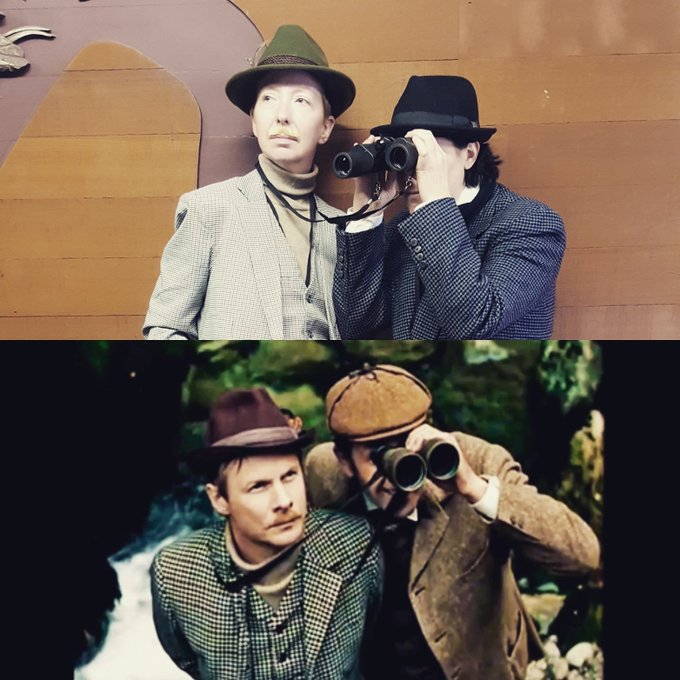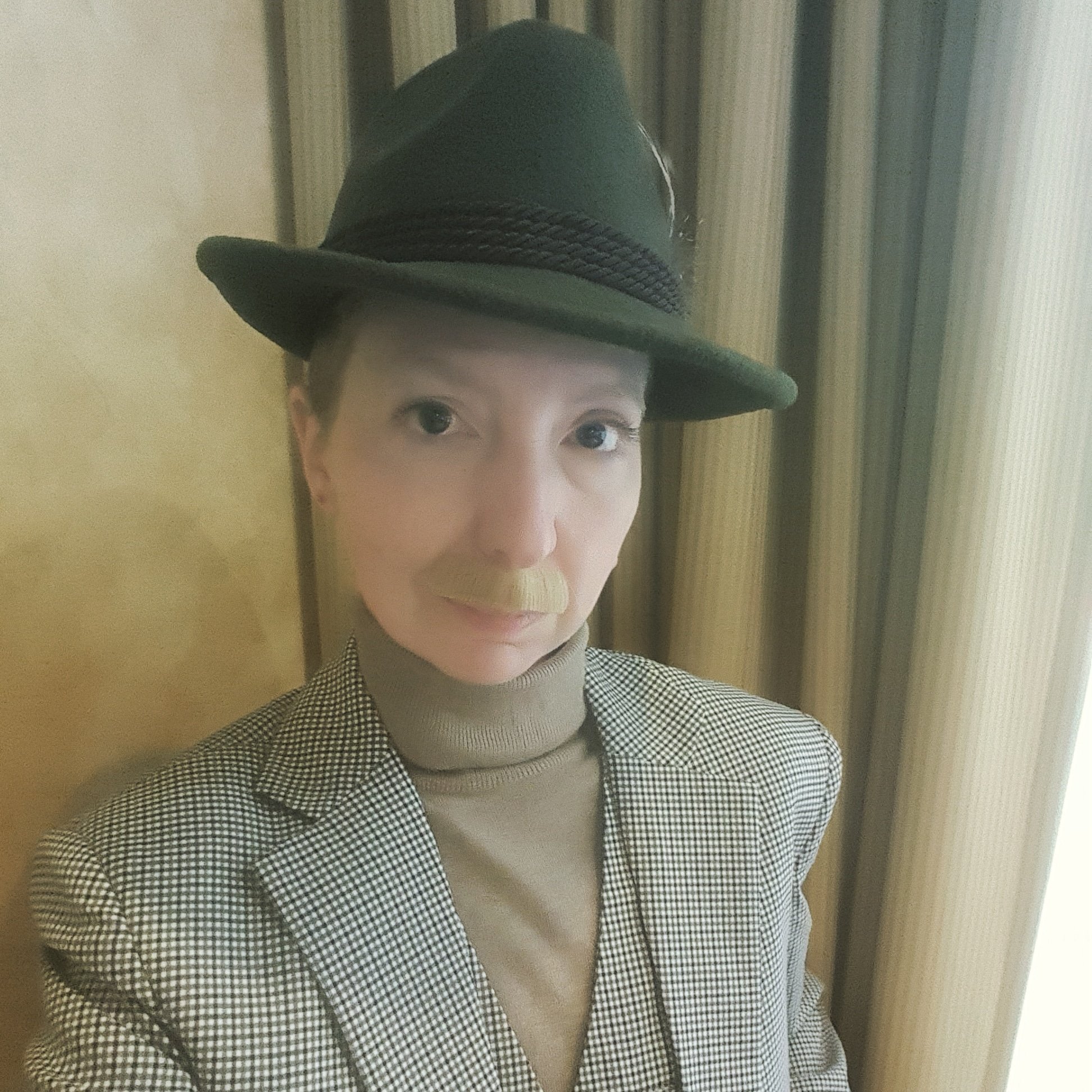When I learned that there was a new Sherlock Holmes convention within spitting distance of Seattle, I was delighted. I was part of the late lamented Sherlock Seattle con committee, which sort of got me back into Sherlock Holmes fandom after a long absence. I joined because I thought there should be more representation of the older iterations in the BBC-focused con; now, I tend to be the voice for the new and the weird in our local scion meetings. So I was even more excited to be chosen as a speaker for LCSS, on the topic of acting and Sherlock Holmes. This was based on my debatable expertise as someone who's taught about Holmes on film and played him on stage a few times. But this entry is about my overall thoughts about the con, so I'll try to find a balance between meaningfully specific and concise.
Overall (for those who want the birds-eye view) I have to say that I am incredibly happy and impressed by the work done by the organizing team and I'm grateful for the fabulous attendees. The weekend went amazingly smoothly, the panels were a fabulous cross-section of the charmingly pedantic, obscure, socially conscious, and poetic sides of the fandom. The crowd was an admirable mix of what I'd term "old school" and internet-raised fans. And the general attitude was one of acceptance, of "big tent" Sherlockianism (in Tim Johnson's words), of joyous celebration. I usually come off of conventions feeling better about fandom than I did before, because it turns out that when you put a bunch of people who love the same thing in different ways into a room, the love usually wins out. I also want to say that I am flattered at being included; I've never given a solo talk at a convention like this, and I was in illustrious company I do not at all feel I am at the level of.
I drove down to Portland with my flatmate, Strangelock, which was emotionally significant for me because we met doing Sherlock Seattle and I feel that our partnership is very Holmes-and-Watson-ish. It's not that we break exactly on those lines, but there are more similarities than not, and so we celebrated that by dressing as the Lenfilm (Soviet) versions of the characters on Saturday.
( Read more... )

Brad Keefauver has blogged way more articulately as I can about the specific panels, partly because he was basically live-blogging the whole way, but some thoughts.
Robert Perret's talk about the questionably scholarly nature of Sherlockian writings was a wonderfully nerdy meta-view of the fandom, which I love because it is an example of the thing it is studying, and I enjoy that kind of thing. Basically I would go to a thing about a thing every time, skipping the thing itself. Next, Sonia Fetherston & Julie McKuras presented a history of the women who have tried to break the glass ceiling of "official" Holmes society in the US which made me basically want to dig up all the past BSI dudes so I could punch them in the skull. Then, we had Chuck Kovacic's charming presentation on his recreation of the Baker Street sitting room. He has VERY strong opinions on how to do it right, and was a very entertaining speaker. Colebaltblue and Sanguinity's talk on Holmestice was mostly stuff I already knew, but here's the thing: I thought it was an incredibly valuable addition to the program. So many people long in the fandom are entirely unaware of a lot of the more recent innovations in fanworks and sharing, and these two managed to bridge that gap beautifully, in an unthreatening and inclusive manner. I think this morning really encapsulated so much that was great about this weekend: the fact that all ways of exploring Holmes are valid, and we can all contribute in our own style.
Speaking of which, next up after lunch were the fine gentlemen from BWAHAHAHA, demonstrating the style of pugilism that might have been described in Watson's writings. (Or rather, mostly by Holmes' description of his own prowess.) If you know me, you know I've dabbed in fencing and aerials and roller skating and all kind of things and I'm definitely going to hit up one of these practices to see how I like it. See again: doing a thing about a thing instead of the thing. If I'm practicing this HISTORY of a thing I'm more interested, for some reason. Next was Nancy Holder up with her presentation about Holmes in science fiction and horror, which was a great overview of the genre fiction our hero has taken part in. It's always made me slightly uncomfortable to combine Holmes with the supernatural, mostly because I like the LOGIC of the world that he represents, and a lot of the supernatural/horror stuff sort of throws all of that into question. But that's a post for another day, maybe. Our last stop of the day was with Dr. Bruce R. Parker on the use of medicine in the canon, which was really fascinating from the perspective of a doctor. I restrained myself and did NOT ask my question about BRAIN FEVER which is one of my favorite ailments of all time, mostly because when you look it up online it's basically only... references to ACD stories.
All in all, a very satisfying day. We had some time before the banquet, and strangelock wasn't going, so we walked downtown to Powell's books and got dinner and got back in time for me to put my mustache back on and mosey on down to the banquet. Having already eaten, I caught up with some of my fellow SOBs and took in the magic show. True to my nature, I enjoyed it more than I expected because it wasn't just a magic show; it was a treatise on centuries-old conjurer gossip. The history of conjuring was just as interesting as the effects themselves.
Day two was the big day, the day of my own presentation. I dressed in a slightly more modern dapper mode, sans facial hair, and placed myself next to Brad at what we deemed the speakers' table, though it was really just half the speakers. Side note: I was so excited to finally meet Brad Keefauver. I first encountered him in 1994 in the message boards of *Prodigy, which was the home of the Wigmore Street Post Office. I still have numerous copies of that zine, where I appear alongside Brad and Lee Shackleford and other greats of the fandom. I brought one with me, for him to sign, which he graciously did, but I cannot even express how gratifying it was to meet in person one of those who accepted a weird 14 year old into one of the oldest fandoms in the world.

First came the raffle, in which I won nothing, and then it was Lyndsay Faye's turn to speak about pastiche and fanfiction and the use of Sherlock in various works. I loved the idea that all novels are sequels, that we're all just riffing off what came before, because I truly believe it. The theme of the day, I think, was "All Holmes is Good Holmes," Lyndsay set us up well with her examination of how we all write the book we want to read, and it's all okay. Nothing erases what you love about the character, and there is room for all of it.
Here's the part where it gets bleak, for me, but transcendent. Tim Johnson of the U of Minnesota delivered a prose poem that covered not just his relationship to Sherlock Holmes and his fandom over the years, but beautifully evoked the way that fandom needs to encompass all visions. I cannot come close to doing it justice, but to hear a man so steeped in the history of this character and fandom make a plea for understanding and inclusion literally made me cry. The standing ovation was the only one of the weekend, and it could not have been more deserved. He was an inspiration.
I was next, and I was devastated to go after Tim, but I spoke a bit about the history of Sherlock on film and about the ways he can be portrayed. I was trying to do something that 1) I hadn't seen done before and 2) combined my dual tracks of studying Holmes on film and playing him on stage. So I basically tried to get people thinking beyond terms of "this is my favorite" into the question of what are they doing? that works (or doesn't) for various people. It seemed well-received! And I enjoyed the comments immensely.
Last but certainly not least (and as I joked in my talk, I was glad he was after me so everyone had stuck around), was Brad Keefauver with his multiverse theory of Sherlock Holmes. It's an attempt to make all versions "true," the idea being that each discrepancy is actually a branched universe. I love this, and it dovetails neatly with the big tent plea of Tim Johnson and the all stories are sequels statement from Lyndsay Faye. I like to think my points fall in there, too, in the sense that I was talking about the multiple "right" ways of being Holmes, and the way those techniques will work on some and not all but it's not objective.
With that, the symposium was over, and after a late lunch at my favorite restaurant in Portland (Nicholas Restaurant, best pita and hummus anywhere) strangelock and I drove home. I don't know where my next fandom adventure lies, but I know I want it to be alongside these people, and I hope if they're reading this they'll stay in touch. All Holmes is Good Holmes, and getting to share him with a room full of like-minded but utterly different fans was a reminder of how rich this fictional life is.

